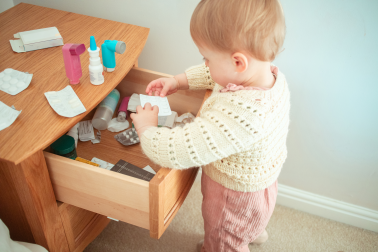Synonyms: “Pill” (to prevent pregnancy), oral contraceptive, hormonal contraceptive, oral ovulation inhibitor, contraceptive pill, mini-pill (progestogen only), oral hormonal contraceptive, combined pill (oestrogen + progestogen), birth control pill
The pill: Oral contraceptive

One month pack. Stock photo: reproductive health supplies coalition auf unsplash
Ingredients and form
The “pill” is a contraceptive in the form of a small tablet, which is taken regularly to prevent pregnancy. It contains either a combination of the female sex hormones oestrogen and progestogen or just progestogen (mini-pill). Depending on the composition, it prevents pregnancy in different ways e.g. by suppressing ovulation or preventing a fertilised egg from implanting in the uterus.
What should you do in an emergency?
If swallowed by children, irrespective of gender:
- Do not induce vomiting.
- Rinse out the mouth and remove any residue.
- Contact Tox Info Suisse if they have consumed more than one month’s pack.
Symptoms
In children:
Usually, there are no symptoms for most children after consuming a monthly pack. Occasionally they may experience nausea, loss of appetite and vomiting.
In women of reproductive age:
They may also experience irregular cycles and interim bleeding.
Further information

Bedside cabinets are not a safe place to store medicines. Foto: Raylipscombe auf iStock
Note on hazards and prevention:
Medications such as the pill are often stored in easily accessible places which increases the risk of small children consuming them by mistake. For this reason all medications – even those that appear harmless at first glance – should always be stored out of the reach of children.
Tip: Store medications in a lockable cabinet or in a child-proof box.
March 2025

